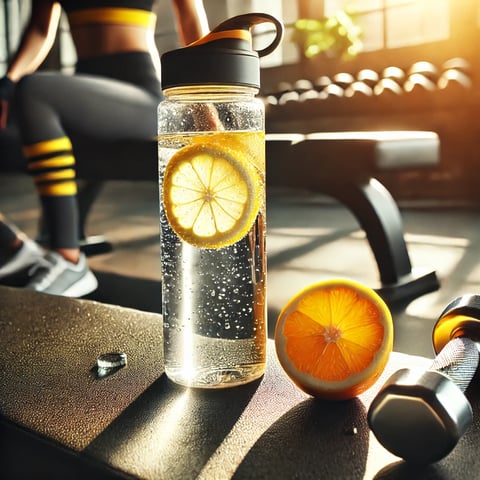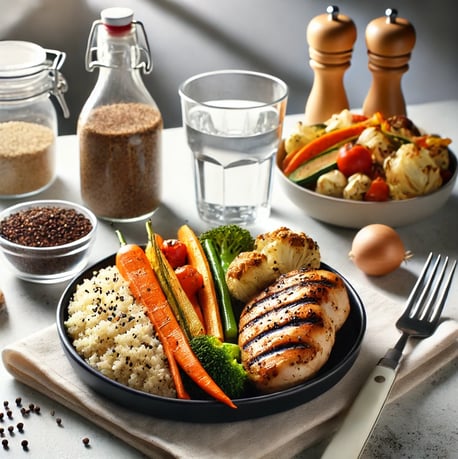How to Improve Your Physical Performance: The Role of Hydration and Nutrition
11/20/20245 min read
We often hear that drinking water is essential for good health, but do we fully understand why staying hydrated is so important? From supporting bodily functions to boosting energy and improving skin appearance, water plays a crucial role in almost every aspect of our health. In this blog, we’ll explore the many benefits of hydration, signs of dehydration, and simple strategies to make sure you’re getting enough water every day.


The Importance of Hydration in Physical Performance
Water is essential for almost every function in the body, including muscle contraction, digestion, and temperature regulation. Staying hydrated is especially important when you are engaging in physical activity, as you lose water through sweat and breathing. Proper hydration ensures that your muscles are working efficiently, helps regulate your body temperature, and prevents fatigue.
Why Hydration Matters for Physical Performance
Maintains Fluid Balance: When you exercise, your body loses fluids through sweat. If you don’t replenish this lost fluid, it can lead to dehydration, which negatively impacts your performance. Dehydration can cause muscle cramps, dizziness, and even heat exhaustion.
Supports Muscle Function: Hydration helps to transport nutrients to muscle cells, supporting energy production and muscle function. Without adequate hydration, your muscles may feel weak or fatigued.
Regulates Temperature: Sweating is your body’s natural way of cooling down during physical exertion. Without sufficient hydration, your body cannot regulate temperature effectively, leading to overheating.
Enhances Recovery: Water plays a key role in removing waste products from your muscles after exercise. By staying hydrated, you can support your body’s natural recovery process and reduce the risk of soreness and injuries.
How to Stay Hydrated
Drink Water Before, During, and After Exercise: Ensure you are hydrated before you start your workout and continue to sip water throughout. After exercise, replenish lost fluids to support recovery.
Electrolytes Are Key: In addition to water, electrolytes like sodium, potassium, and magnesium are essential for hydration. They help balance fluids and support muscle function. Consider drinking an electrolyte-rich beverage if you're engaging in prolonged or intense exercise.
Monitor Your Urine Color: A simple way to gauge hydration is by checking the color of your urine. If it’s pale yellow, you're well-hydrated. If it’s dark yellow or amber, it’s time to drink more water.
Nutrition: Fueling Your Body for Peak Performance
Nutrition plays an equally important role in maximizing physical performance. What you eat before and after exercise can affect your energy levels, muscle recovery, and overall endurance. The right balance of macronutrients—proteins, carbohydrates, and fats—provides your body with the fuel it needs to perform at its best.
1. Carbohydrates: The Body's Main Source of Energy
Carbohydrates are the body's preferred source of energy, especially during high-intensity workouts. Carbs are broken down into glucose, which is used by muscles for quick energy. Consuming enough carbs before and after exercise helps replenish glycogen stores, preventing fatigue and improving endurance.
Where to find it: Whole grains, fruits, vegetables, and legumes.
When to eat it: Focus on consuming carbs 2-3 hours before exercise and immediately after to replenish glycogen stores.
2. Proteins: Building Blocks for Muscle Repair
Protein is essential for repairing and building muscle tissue. During exercise, especially strength training, muscle fibers break down. Consuming adequate protein helps repair these fibers and promotes muscle growth and recovery.
Where to find it: Chicken, turkey, fish, tofu, lentils, quinoa, and eggs.
When to eat it: Aim to consume protein both before and after exercise to support muscle repair and growth.
3. Fats: Supporting Long-Term Energy
Healthy fats provide a slower, sustained release of energy, which is especially important for endurance athletes or those participating in long-duration activities like running or cycling. Fats also support the absorption of fat-soluble vitamins, which are important for overall health.
Where to find it: Avocados, nuts, seeds, olive oil, and fatty fish.
When to eat it: Include healthy fats in your diet throughout the day for sustained energy, especially in longer workouts or activities.
4. Vitamins and Minerals: Essential for Energy Production
Vitamins and minerals play a crucial role in energy production, muscle function, and overall health. For example, magnesium helps with muscle relaxation, calcium supports bone strength, and vitamin C aids in recovery.
Where to find it: Leafy greens, dairy products, citrus fruits, nuts, and seeds.
When to eat it: Include a variety of colorful fruits and vegetables in your meals to ensure you're getting a full range of essential vitamins and minerals.


Pre-Workout Nutrition: Fueling for Success
Eating the right foods before a workout helps provide energy, improves endurance, and supports muscle function during exercise. A good pre-workout meal should include a combination of carbohydrates for energy, protein for muscle support, and healthy fats for sustained energy.
Pre-Workout Meal Ideas:
A whole-grain toast with almond butter and banana.
Greek yogurt with mixed berries and a drizzle of honey.
A smoothie made with spinach, protein powder, banana, and almond milk.
When to Eat:
Try to eat your pre-workout meal 30-60 minutes before exercise to allow your body to digest and absorb nutrients.
Post-Workout Nutrition: Replenishing and Recovering
After your workout, it’s important to eat a meal that promotes recovery and muscle repair. Your body needs protein to rebuild muscle tissue and carbohydrates to replenish glycogen stores that were depleted during exercise.
Post-Workout Meal Ideas:
A protein shake with a scoop of protein powder, almond milk, and a handful of spinach.
Grilled chicken with quinoa and roasted vegetables.
A smoothie with protein powder, pineapple, spinach, and chia seeds.
When to Eat:
Aim to eat within 30-60 minutes after your workout to maximize recovery and muscle repair.
Supplements for Performance: Do You Need Them?
While it’s always best to get your nutrients from whole foods, some athletes or fitness enthusiasts may benefit from supplements. Common supplements for improving physical performance include:
Protein Powder: For muscle repair and growth.
Creatine: To improve strength and power during high-intensity activities.
BCAAs (Branched-Chain Amino Acids): To support muscle recovery and reduce soreness.
Caffeine: To boost energy and enhance endurance during workouts.
Before starting any supplement, it’s important to consult with a healthcare provider to ensure it’s safe and appropriate for your goals.
Conclusion
To optimize your physical performance, it’s essential to focus on both hydration and nutrition. Water supports muscle function and recovery, while the right balance of carbohydrates, protein, fats, and vitamins provides the fuel your body needs for energy, strength, and endurance. By fueling your body with the right foods and staying hydrated, you can enhance your workouts, improve recovery, and reach your fitness goals more effectively.
Remember, it’s not just about what you do during your workout, but also what you do before and after. Prioritize hydration and balanced nutrition to support your body’s needs and perform at your best every day.
Joy
Inspire your journey to happiness and fulfillment.
contact us
Growth
© 2024. All rights reserved.


